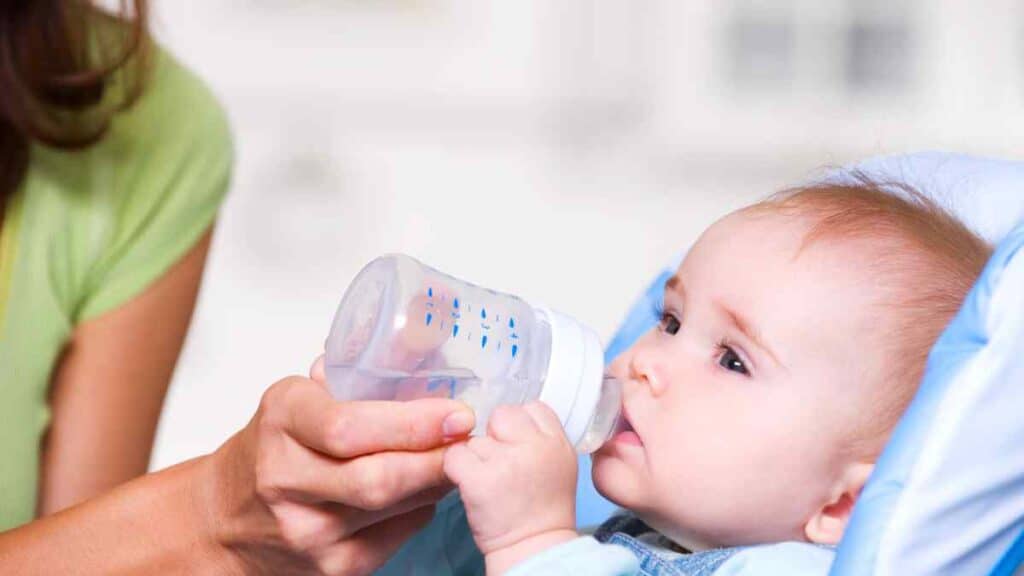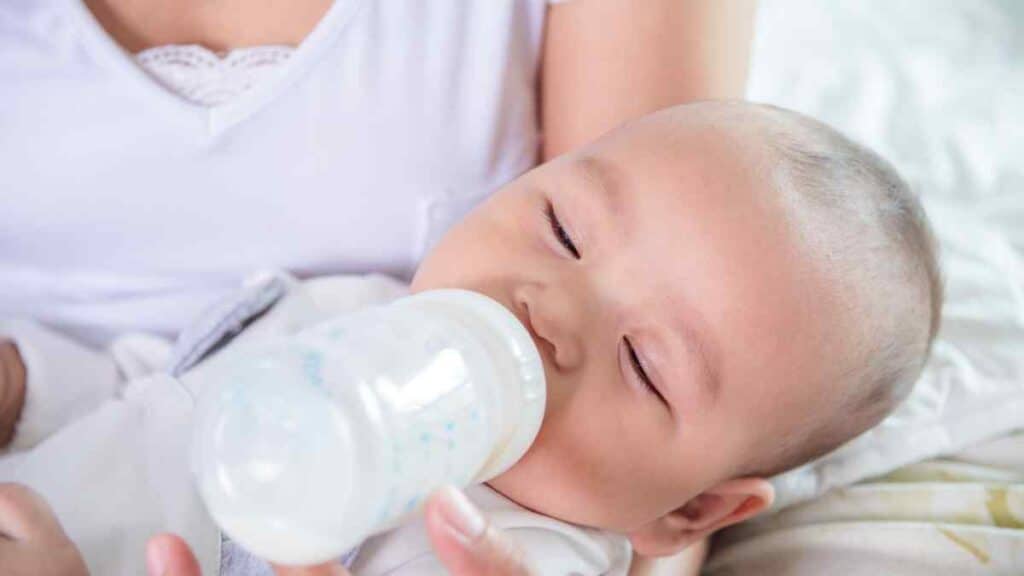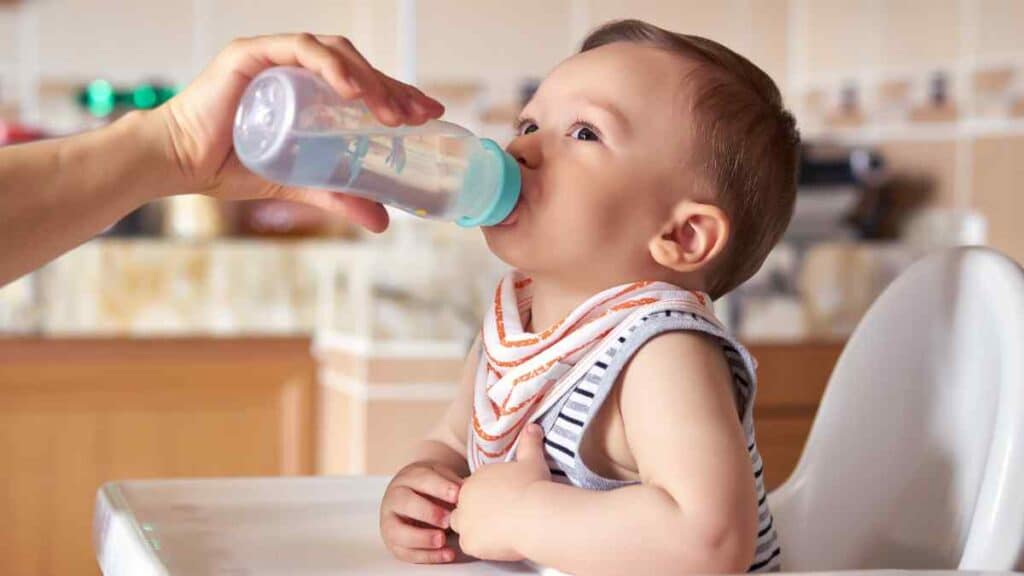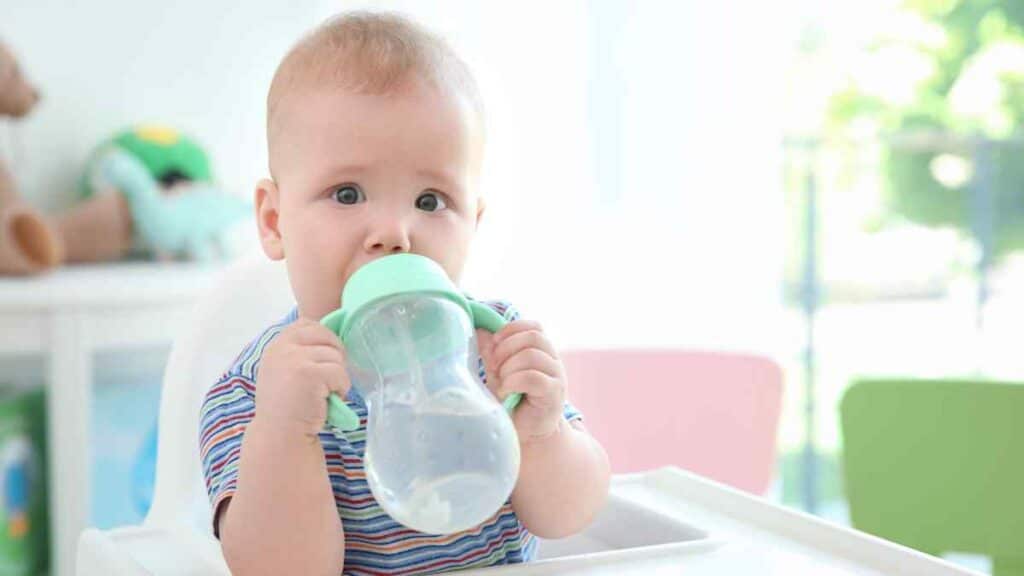In the ever-evolving landscape of infant care, parents and caregivers are constantly bombarded with information, advice, and recommendations. Among these many suggestions, one topic that often sparks interest is the type of water to use for baby care—more specifically, whether or not to use distilled water. Distilled water, recognized for its high purity level due to the process of distillation, is often touted as a safe choice.
However, like most decisions regarding infant care, the issue is not black and white. This article aims to delve into the advantages and disadvantages of using distilled drinking water for babies, providing a comprehensive view to help you make informed decisions for your little one’s health and well-being.

Learning The Basics of Distilled Water
What is Distilled Water?
Distilled water is the result of a distillation process where water is boiled, and the steam is collected and condensed back into a liquid form [1]. This process effectively removes most of the impurities, including minerals dissolved in the original water source.
Distilled Water vs. Purified Water
Is purified water the same as distilled water? Not quite. While both are treated to remove impurities, the purification process might include other methods like filtration, reverse osmosis, or deionization. Therefore, all distilled water is purified, but not all purified water has been through the distillation process.
Distilled Water and Your Baby
Can Babies Drink Distilled Water?
Can babies have distilled water, or can babies drink distilled water by itself? These are common questions for new parents. While it is safe to drink, it’s not typically recommended for babies to drink distilled water by itself due to the lack of essential minerals.
Best Water for Baby Formula
When it comes to what water to use for baby formula, both distilled and purified water are often recommended to ensure water quality. This is because both have been treated to remove potential contaminants that can pose health risks. Whether you choose distilled or purified water for baby formula preparation will depend on your personal preference, as long as it is safe to drink.
Nursery Water vs. Distilled
Nursery water is often marketed as the best water for baby formula, but how does it compare to distilled water? Nursery water can be either distilled or purified but sometimes contains added fluoride. Fluoride-free water may be preferred for babies under six months to avoid excessive intake.
Other Uses of Distilled Water
Distilled Water in Healthcare
For people using devices like continuous positive airway pressure (CPAP) machines or for tasks like nasal irrigation, only distilled water is recommended to avoid the buildup of minerals in the equipment.
Private Drinking Water Systems
Households with private drinking water systems might consider utilizing distilled water, especially if the tap water quality does not meet the Environmental Protection Agency’s (EPA) guidelines. Testing your water and considering a filtration or purification system as needed is crucial.

Advantages of Using Distilled Water for Babies
When it comes to caring for our little ones, every decision is crucial—including the choice of water we use for them. Among various options like tap water, purified water, and spring water, distilled water holds unique advantages, particularly when preparing baby formula. Let’s delve into the benefits of using distilled water for babies.
Absence of Harmful Impurities
1. Potential Contaminants in Tap Water
Tap water is generally safe for healthy adults to drink. However, for babies with compromised immune systems, it may contain harmful contaminants such as bacteria, viruses, or other impurities. Even trace elements of chemical pollutants or heavy metals could have a significant impact on infant health.
2. How Distillation Eliminates These
The distillation process involves boiling water and collecting the steam, which then condenses back into water. This process effectively removes most, if not all, contaminants. Unlike filtered water or water treated by reverse osmosis, distilled water has almost all its total dissolved solids removed, leaving you with pure water.
Lack of Heavy Metals
1. The Dangers of Heavy Metals for Infant Health
Heavy metals like lead and mercury can pose serious health risks to infants. Unfortunately, these can sometimes be found in tap water, depending on your location and water source.
2. The Role of Distillation in Removing These
Distillation removes these heavy metals, making distilled water a safer choice for babies, particularly when preparing baby formula.
Flat Taste
1. How This Can Help with Acceptance by Infants
Distilled water has a flat taste due to the lack of minerals. While adults might find this less appealing, infants, especially those who are primarily breastfed, may accept it more readily because of its similarity in taste to breast milk.
Reduced Risk of Waterborne Diseases
1. Explanation of Waterborne Diseases and Their Potential Impact on Infants
Waterborne diseases are typically caused by bacteria, viruses, or other microorganisms that can be present in untreated water. Babies, due to their developing immune systems, are especially vulnerable to such diseases.
Distilled water, with its absence of impurities, offers protection against these potential diseases. This safety, along with the flat taste, is why distilled water is often the preferred choice for infant formula. Distilled water is also a good choice for other baby care needs, such as nasal irrigation.
When comparing purified vs distilled water for baby care, it’s worth noting that both processes aim to remove impurities. However, the distillation process is often more effective at removing contaminants. Therefore, whether you’re deciding on the best water for baby formula or general hydration, distilled water holds clear benefits.

Disadvantages of Using Distilled Water for Babies
While distilled water is often recommended for infants due to its lack of contaminants, it’s essential to balance these benefits against the potential downsides. Here are some key points to consider when using distilled water for your baby.
Lack of Essential Minerals
1. Explanation of Minerals Typically Found in Water
Water is a natural source of minerals such as calcium, magnesium, and fluoride. These are referred to as healthy minerals or trace elements, which the human body requires for various functions.
2. The Importance of These for Infant Health
Infants need these minerals for growth and development. Calcium, for example, contributes to bone health, while magnesium plays a role in nerve function. The removal of these minerals in the distillation process means your baby could miss out on these important nutrients if only distilled water is consumed.
Potential Risk for Dental Health
1. How Fluoride in Water Can Protect Against Tooth Decay
Fluoride is a mineral that’s often added to tap water and is essential for dental health. It strengthens the tooth enamel, making it more resistant to decay.
2. The Absence of Fluoride in Distilled Water
Distilled water, due to the distillation process, lacks fluoride. If it’s the primary source of your baby’s drinking water, your child may miss out on this protection against tooth decay.
Environmental Impact
1. The Energy Cost of Water Distillation
The distillation process is energy-intensive, requiring heat to boil the water and produce steam. In terms of environmental impact, it’s worth considering the energy cost associated with large-scale distillation.
2. The Potential Waste from Bottled Distilled Water
Bottled water, whether distilled or purified, also comes with the problem of plastic waste. Although these bottles can be recycled, not all of them make it to the recycling bin, contributing to environmental pollution.
Extra Cost
1. Comparison of the Cost of Distilled Water and Tap Water
Distilled water, especially if bought bottled, can be significantly more expensive than tap water. While the cost may not be a concern for some, for many families, the price difference could be a deciding factor, especially when considering the large quantities needed for preparing baby formula.
In conclusion, while distilled water has its advantages, parents and caregivers should consider these potential downsides when deciding on the best water for baby formula or other uses. As always, a healthcare professional can provide the best advice for your baby’s specific needs, considering all factors, including the local water quality and your baby’s diet.

Recommendations for Parents and Caregivers
Making decisions for your baby’s health and well-being can often feel like navigating a complex maze. With many factors to consider, from the type of water you use to the nutrients your baby needs for healthy growth, it’s crucial to stay informed. Here are some recommendations for when to consider using distilled water, maintaining a balanced diet, promoting dental health, and choosing environmentally friendly options.
When to Consider Using Distilled Water
While tap water is generally safe to use, there are situations where distilled water might be the better choice. For instance, if your local water supply has known contamination issues or high levels of certain minerals, using distilled water for babies could be a safer option. Likewise, when preparing baby formula, distilled water is often recommended because it’s virtually free of impurities. Remember to consult your healthcare provider for the best choice based on your unique circumstances.
The Importance of a Balanced Diet to Ensure Sufficient Nutrients
Using distilled water does not provide your baby with necessary minerals such as calcium and magnesium that are found in other waters like mineral water or some types of tap water. This fact emphasizes the importance of ensuring your baby receives a balanced diet packed with all the essential nutrients for healthy growth and development. If your baby is on a formula diet, choose a formula that is fortified with the necessary vitamins and minerals.
Guidance on Dental Health for Infants
One notable downside of distilled water is the lack of fluoride, which is added to many public water supplies and helps prevent tooth decay. If you’re using distilled or purified water for baby formula, consider using a fluoride supplement or a formula containing fluoride for your baby’s dental health. Always consult with a healthcare provider before starting any supplement regimen for your baby.
Environmentally Friendly and Cost-Effective Options for Using Distilled Water
While purified bottled water and distilled water might be safer choices due to the absence of contaminants, they come at both an environmental and financial cost. Consider home water distillation units or countertop water distillers, which can be more environmentally friendly and cost-effective in the long run compared to buying bottled water.
Remember, purified vs distilled water, or even tap water, each has its pros and cons. The best choice often depends on various factors, including your local water quality, your baby’s specific needs, and your personal preference. As always, consult a healthcare professional for personalized advice regarding your baby’s diet and hydration needs.
Conclusion
Deciding the type of water to use for your baby’s needs is an important aspect of their overall health and development. Distilled water, with its purity from contaminants, offers a safe option, especially when preparing baby formula or when the local water supply is unreliable. Its lack of potentially harmful bacteria and other contaminants can provide peace of mind for parents concerned about the quality of their tap water.
However, this does not negate the potential downsides of distilled water. The absence of essential minerals, the potential risk for dental health, the environmental impact of its production, and the potential extra cost are all factors that need to be weighed against the benefits.
A balanced diet, rich in essential minerals, is necessary to counteract the lack of minerals in distilled water. Furthermore, considering dental health, you might need to discuss fluoride supplementation with a healthcare provider if using distilled water for baby formula.
In terms of environmental impact and cost, solutions like home distillation units or water purifiers can be explored for a more sustainable and cost-effective approach.
In conclusion, the choice between distilled, purified, or tap water is not a one-size-fits-all solution. Each comes with its own advantages and disadvantages. It requires careful consideration, informed by reliable information and advice from healthcare professionals. It’s important to make an informed decision based on your unique circumstances and your baby’s specific needs to ensure their healthy growth and development.
Thanks for reading! If you found this article helpful, share it with others.



